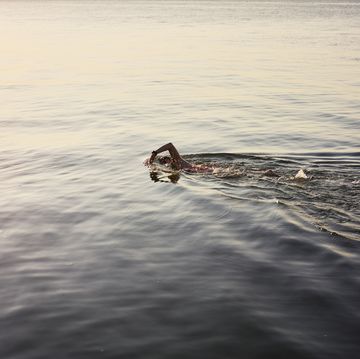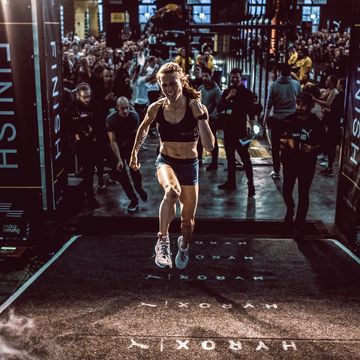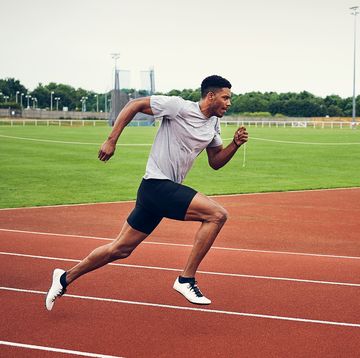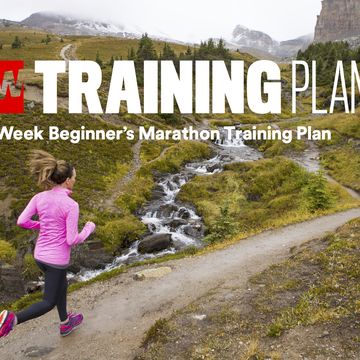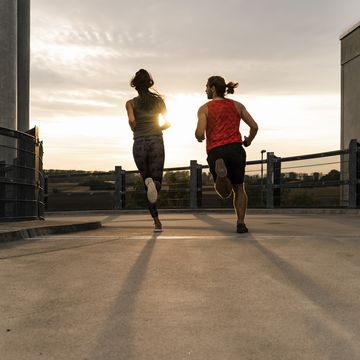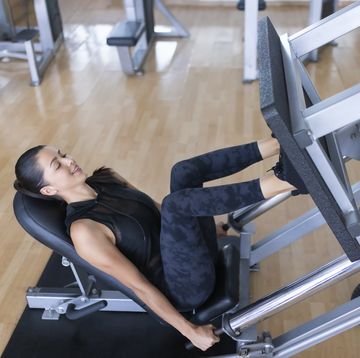What started as a form of escape from a stressful career soon became a full-time vocation for Becs Gentry, the now Peloton trainer and 2:37:12 marathon runner. In perhaps her most inspiring challenge yet, on Friday 26 March Becs will be toeing the start line of the How to get started on the running track.
Speaking on social media about the trials, Becs said, 'It is the biggest honour in my running career that I've ever been given, the biggest opportunity I've ever been given and the biggest test that I will ever do. Needless to say, I am petrified, but also incredibly excited.'
Here's what happened when we caught up with Becs, when she appeared on the cover of Runner's World in 2017.
So, where did it all start?
‘At school I ran and ran – lacrosse, athletics, cross-country – but then University took over and the life of drinking and partying. After University I had an office job and throughout that career I needed to get away from it, I needed some sort of meditation. When I moved to Brighton it became running on the seafront, and it completely freed my mind. From there it became an obsession, I was getting up at 4.30am to go for long runs into the South Downs before getting a 7am train to London. It was for the de-stressing and the headspace, no music, just time to myself.
'Then I did a 5K run for Cancer Research in Brighton and realised I wanted more, to start training properly. I found that increasingly in my day job I was talking to people about fitness and one day the penny dropped and I thought: “What am I doing?” I’m in the wrong industry…”’
What does running bring to your life now?
‘It’s still massively the mental side of it. Now my coaching means I run one-to-one with people, I lead groups, I teach treadmill classes, so when I run for myself it’s very much about my own time – the peace of mind.’
What running achievements are you most proud of?
‘Winning the Speed Project (a 340-mile relay ultra race from Santa Monica pier in Los Angeles to Las Vegas) with my team has got to be the biggest achievement in my running life. The six of us knew we were going to win for a while, but we didn’t think we were on for the record. I blame the boys’ maths, but once we realised we really pushed it and we ended up coming in six minutes under.’
What was your lowest moment in running?
‘A couple of years ago I slipped on my stairs and broke a metatarsal in my foot and couldn’t run for ages. I started cycling and when I finally got back to running I found I had completely changed my muscular strength and I didn’t enjoy it. I thought, “Oh no, the passion has gone.” Everything had changed, my knees hurt, my ligaments, my tendons, and it took me a really long time to get past that 5, 10K mark again. It was easier in group sessions, but on my own it was horrible and I just felt like I didn’t want to do it.’
What do ultras offer that shorter distances don’t?
‘Running is quite typically a solo sport, whereas ultras introduced me to that feeling of running in a team and I really loved that. Plus, in ultras you don’t necessarily have to push yourself on the speed side. You have to get your head around the distance and the toll it will take on your body, but you can take it at whatever pace you want and if you’ve got that mindset they’re actually very enjoyable. You can stop for cake, meet people along the way, and enjoy what are typically beautiful parts of the world that you wouldn’t necessarily get to see otherwise.’
What has been your favourite so far?
‘The Sciacche Trail (a 47K ultra in Italy) is definitely up there. It was mind-blowingly beautiful. Plus the local people were amazing. It’s festival time… they’re all out on the street cheering for you. And I did it step by step with my best friend all the way. People got to know us and by the last village they were cheering “Rebecca! Rebecca!” – we’re both called Rebecca.’
And what’s still on your bucket list?
‘The North Pole Marathon or something else in the Artic…I’m not sure why as I don’t like being cold, but for some reason I really, really want to do that.
'And I would love to do a long run somewhere that no one has before. I love reading Lizzie Hawker’s books about her running in places like Tibet where she just goes out there and runs.’
How much satisfaction do you gain from getting others into running?
‘The coaching side is why I get up every day. I love seeing someone go from initially hating running to loving it, and a year later having run all sorts of races.
It also really drives me in my own running because I know what I do can inspire others – people who are following me on social media (@becsgentry) or people I train. Those times when I don’t really feel like it, I think about someone out there starting out and hope that I might inspire them, even if I just go out for a quick run.’
How important is the social – and social media – aspect of running now?
‘It can be positive in terms of inspiring commitment, but the downside with groups and social media is there can be a lot or pressure. The pressure of being judged for being there, for mileage, for pace, this need to always take pictures, for proof… it can be positive, but it can also be demoralising and even dangerous when it makes people run through injury. I once saw someone turn up wearing a boot for a stress fracture! I really encourage doing some sessions with just a basic digital watch, for yourself and not for public consumption. When I was training for the Speed Project I probably recorded one or two runs a week, but I was doing 10 to 12. At the beginning that meant I could be more focused on training according to how my body felt on the day rather than how the stats would look afterwards. I was more relaxed, and I enjoyed it more. It was just about me and my run. The only person who could see my sessions was my coach, and he was the only person who could criticise me. Although by the end I didn’t care how the stats looked on social media.’
How do you stay motivated from one challenge to the next?
‘Stubbornness. I take a long time to make my mind up about something – I think it through as I’m conscious that my time isn’t just mine, that it affects my family – but once that decision is made I’m very, very stubborn. If I’ve committed to a race I don’t care what’s happening, I’m going out to train. I remember one morning when I was training for the Speed Project and I had to go out really early to run a time trial, and it was snowing and the canal was frozen and I was wearing as many layers as I could possibly get on. At one point I started wondering if it would be easier to just fall in the canal and see if someone rescued me. But I finished the run and it never got worse than that morning.’
What’s the best running advice you’ve been given?
‘To take every day as it comes. Don’t compare yourself to the runner you were yesterday and don’t forsee the runner you may be tomorrow. Take every single run and use it for you on that day. So it doesn’t matter if you have a training programme that says you have to go five per cent faster than last week. If it doesn’t happen, it doesn’t matter. You’ve got to re-set and re-start.
Be in tune with your body. If something doesn't feel right on that day and you don’t want to run, don’t run. Don’t write your day off and go and eat five pizzas and a box of chocolates, just train in a different way – a gentle way – and then restart the next day.
Also, that you don’t have to run fast… a big thing in my coaching is dealing with that misconception people have that they have to run fast. My favourite line is: “Running is an extension of walking.” If you can walk, you can run. That’s what I like to start with…’
reasons why you should be deadlifting? Sign up to our newsletter to get more articles like this delivered straight to your inbox.
While you're at it, week strength training plan for runners reasons why you should be deadlifting


